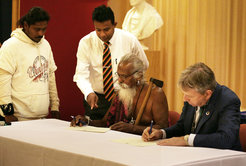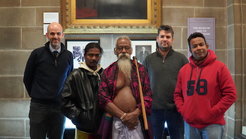Repatriation of Wanniyalaeto (‘Vedda’) Remains Following Ceremony in Edinburgh
"The dead are very important in Wanniyalaeto society," said Chief Uruwarige Wanniyalaeto. "This reuniting of spirits and physical remains... is a very special moment for my people."
The Chief of the Wanniyalaeto Indigenous group of Sri Lanka, Uruwarige Wanniyalaeto, and another elder, Heenbanda Uruwarige, have attended a ceremony hosted by the University of Edinburgh to claim back their ancestral remains and return them for burial in Sri Lanka. This ceremony comes at the end of two years of collaborative work by the Wanniyalaeto (‘Vedda’) elders, the Department of Archaeology, Max Planck Institute for the Science of Human History, and the University of Edinburgh.

The ceremony, which took place at the University of Edinburgh’s Playfair Library on Friday, November 22, saw the return of nine human skulls thought to be more than 200 years old to the rightful custody of the Wanniyalaeto community. Following their return to Sri Lanka, the remains will go through a process of ancestral rights before being buried in a ceremony as part of the Wanniyalaeto’s annual celebration of the dead, to which senior members of the Department of Archaeology and the University of Edinburgh have been invited to attend.
The skulls, which were taken from Sri Lanka during the British colonial period, have been housed in the University of Edinburgh’s anatomical collection for more than a hundred years. Biochemical analysis supervised by the Wanniyalaeto and the Department of Archaeology demonstrated that these individuals practiced specialized tropical forest foraging prior to British colonialism and the emergence of the Sri Lankan nation state. Today, the Wanniyalaeto, like many Indigenous groups, are forbidden to hunt on their traditional forest home and are gradually becoming part of the broader Sri Lankan economic and education system. The paper resulting from this analysis, published in Human Ecology, is being used by the Wanniyalaeto to reassert their rights to use their traditional hunting grounds and be an active part of wildlife conservation in Sri Lanka.
The knowledge gained from this work as well as the repatriation process will also feed into the Wanniyalaeto’s own cultural heritage museum in Dambana village, where they seek to protect and preserve details about their language, subsistence strategies, social structures, and burial practices for future generations in the face of the rapid disappearance of their culture. Commenting at the ceremony, Chief Uruwarige Wanniyalaeto, said: “The dead are very important in Wanniyalaeto society. Every year we hold a special ceremony to honour those who are no longer with us. Even though these remains have been in Edinburgh for many years, their spirits have remained with us in the forest. This reuniting of spirits and physical remains – for which I thank the University – is a very special moment for my people.”
The ceremony and repatriation was featured on major news outlets last week including the BBC and the Times, as well as a number of local news channels and papers in Sri Lanka. Upon arrival in Sri Lanka on Sunday, the Wanniyalaeto and the ancestral remains were met by a welcome party of Wanniyalaeto elders, government officials, and journalists. Professor Tom Gillingwater, Chair of Anatomy at the University of Edinburgh, followed: “We were delighted to welcome the Wanniyalaeto to Edinburgh and mark the return of their ancestral remains. Our vast and diverse collection is often used in research breakthroughs and teaching. We are pleased to be able to return these remains to help ensure the Wanniyalaeto’s legacy endures for generations to come.”
Dr. Patrick Roberts and Mr. Oshan Wedage of the Department of Archaeology have consulted the Wanniyalaeto throughout this process, including during visits to Sri Lanka, and conveyed their wishes to the University of Edinburgh. Dr. Roberts states: “It has been an honour to work with the Wanniyalaeto during this process, to consult with them, learn about their traditions and cultural heritage, and to finally witness the completion of the repatriation process. Let us be clear, the Wanniyalaeto should never have had to undertake this process and the removal of these remains from Sri Lanka was part of a long series of colonial atrocities. Nevertheless, I hope that more European institutions will follow in the footsteps of the supportive and welcoming attitude of the University of Edinburgh and develop clear policies on the return of ancestral remains to their rightful communities.”

Mr. Oshan Wedage, who continues to work with the Wanniyalaeto in Sri Lanka said: “Although the need for repatriation is the product of a sad period in human history, I hope that the international platform of this repatriation ceremony elevates the cause of the Wanniyalaeto. In particular, I hope it encourages activists and government officials to consider that the tropical forests of Sri Lanka are best preserved in collaboration with their traditional stewards.” The Department of Archaeology will continue to work with the Wanniyalaeto, alongside other Sri Lankan academic and government institutions, on a number of cultural heritage projects moving forward, including the final burial rites for these individuals later in 2020.

